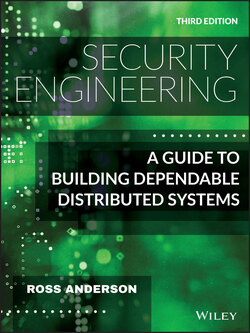Читать книгу Security Engineering - Ross Anderson - Страница 10
For my daughter, and other lawyers…
ОглавлениеThe tricks taught in this book are intended only to enable you to build better systems. They are not in any way given as a means of helping you to break into systems or do anything else illegal. So where possible I have tried to give case histories at a level of detail that illustrates the underlying principles without giving a ‘hacker's cookbook’.
Governments fought to restrict knowledge of cryptography until the turn of the century, and there may still be people who believe that the knowledge contained in this book should not be published.
Their fears were answered in the first book in English that discussed cryptology, a 1641 treatise on optical and acoustic telegraphy written by Oliver Cromwell's cryptographer and son-in-law John Wilkins [2025]. He traced scientific censorship back to the Egyptian priests who forbade the use of alphabetic writing on the grounds that it would spread literacy among the common people and thus foster dissent. As he said:
‘It will not follow that everything must be suppresst which may be abused… If all those useful inventions that are liable to abuse should therefore be concealed there is not any Art of Science which may be lawfully profest.’
The question was raised again in the nineteenth century, when some well-meaning people wanted to ban books on locksmithing. In 1853, a contemporary writer replied [1899]:
‘Many well-meaning persons suppose that the discussion respecting the means for baffling the supposed safety of locks offers a premium for dishonesty, by showing others how to be dishonest. This is a fallacy. Rogues are very keen in their profession, and already know much more than we can teach them respecting their several kinds of roguery. Rogues knew a good deal about lockpicking long before locksmiths discussed it among themselves … if there be harm, it will be much more than counterbalanced by good.’
Thirty years later, in the first book on cryptographic engineering, Auguste Kerckhoffs explained that you must always assume that the other side knows the system, so security must reside in the choice of a key.
His wisdom has been borne out by long experience since. The relative benefits of ‘Open’ versus ‘Closed’ security systems have also been studied by researchers applying the tools of dependability analysis and security economics. We discuss their findings in this book.
In short, while some bad guys will benefit from a book such as this, they mostly know it already – and the good guys benefit much more.
Ross Anderson
Cambridge, November 2020
